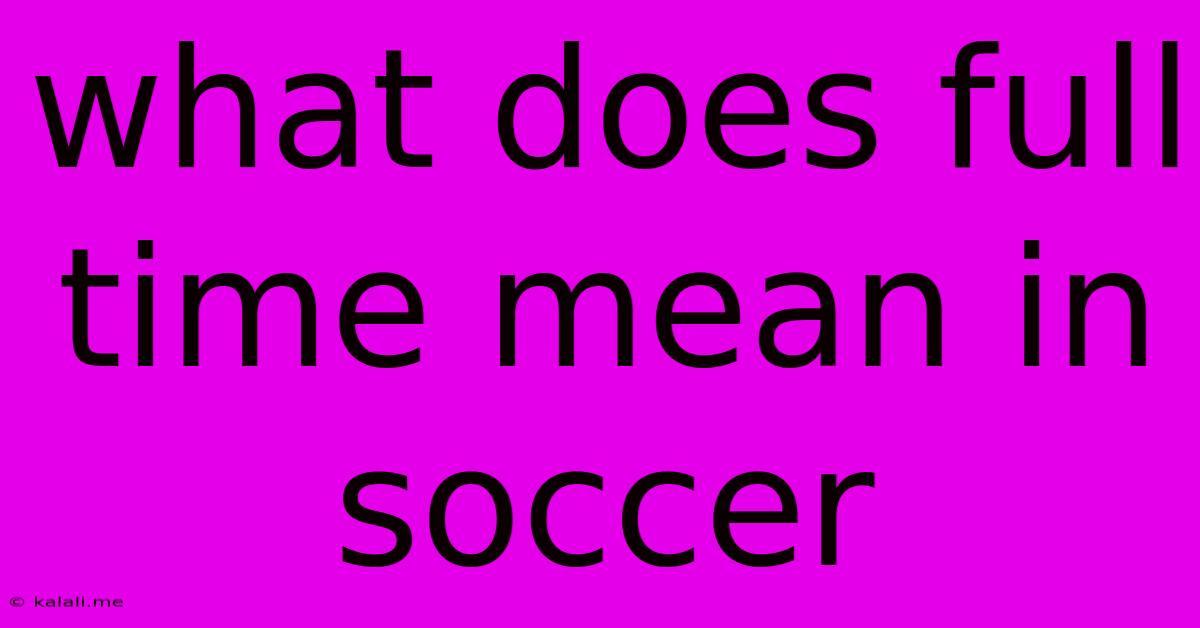What Does Full Time Mean In Soccer
Kalali
May 29, 2025 · 2 min read

Table of Contents
What Does Full Time Mean in Soccer? Understanding Match Durations and Stoppages
So, you're watching a soccer match and the announcer suddenly declares "Full Time!" But what exactly does that mean? It's more than just the clock hitting zero. This article will delve into the intricacies of "full time" in soccer, explaining the standard match duration, injury time, and why the final whistle doesn't always sound at precisely 90 minutes. Understanding this will enhance your appreciation of the beautiful game.
Understanding the Standard Match Duration
A standard soccer match, at the professional level, consists of two 45-minute halves. This adds up to a total of 90 minutes of playing time. However, this is rarely the actual time the game lasts. Numerous factors influence the overall match duration, leading to what we call "full time."
The Role of Stoppages and Injury Time (Added Time)
The 90-minute timeframe doesn't account for stoppages in play. These can include:
- Injuries: Players requiring medical attention.
- Goal celebrations: The joyous (and sometimes lengthy) celebrations after a goal.
- Substitutions: The process of changing players on the field.
- Time-wasting: Deliberate tactics by players to run down the clock.
- Referee decisions: Discussions, card presentations, and other referee interventions.
The referee is responsible for accounting for these stoppages by adding on "added time," also known as injury time or stoppage time. This added time is announced at the end of each half and is displayed on the scoreboard. It's not a fixed amount and is entirely at the referee's discretion, based on the number and duration of stoppages.
What "Full Time" Really Means
"Full Time" signifies the completion of the match, including the standard 90 minutes and any added injury time. It's the point at which the referee blows the final whistle, indicating the official end of the game. This doesn't necessarily mean the game lasted exactly 90 minutes. It often extends beyond that, sometimes significantly, depending on how much added time is given.
Extra Time and Penalty Shootouts
In knockout competitions like the FA Cup or Champions League, if the score is level at full time, extra time is often played. This usually consists of two 15-minute halves. If the scores remain tied after extra time, a penalty shootout determines the winner. These are additional periods beyond full time.
In Conclusion
While a soccer match is scheduled for 90 minutes, "full time" refers to the actual conclusion of play, including any added injury time. This dynamic duration adds to the unpredictability and excitement of the game. So next time you hear "Full Time," you'll know it represents the culmination of a potentially longer period than the initial 90 minutes suggest. Understanding this nuance makes you a more informed and engaged soccer fan.
Latest Posts
Latest Posts
-
What Does A Bar Mean In Discret Math
May 30, 2025
-
Does Consent And Agree Mean The Same
May 30, 2025
-
Starfield How Do I Know Achievements Are Disabled
May 30, 2025
-
Factory Wiring Harness Color Code Nissan Radio Wiring Diagram
May 30, 2025
-
How Long Does A Wheel Alignment Take To Do
May 30, 2025
Related Post
Thank you for visiting our website which covers about What Does Full Time Mean In Soccer . We hope the information provided has been useful to you. Feel free to contact us if you have any questions or need further assistance. See you next time and don't miss to bookmark.